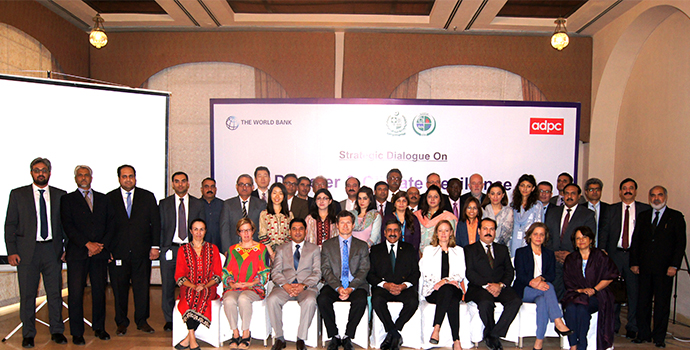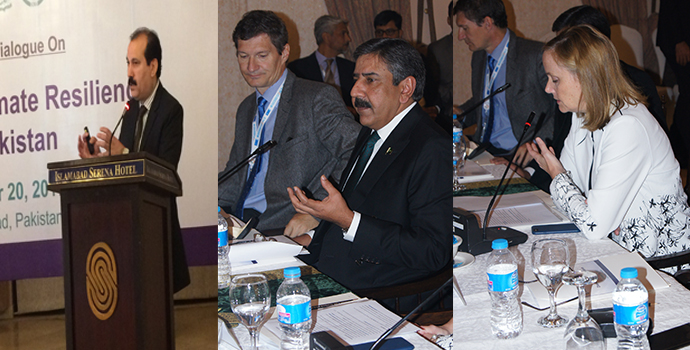- About Us
-
Who we are
-
- Publications
-
- ADPC Academy
-
MediaADPC'S NEWS
On the road to disaster resilience: NDMA, Pakistan brings partners together On the road to disaster resilience: NDMA, Pakistan brings partners together
20 Oct 2017
Islamabad , Pakistan

Participants pause for a group photo.
Experts and donors stressed the need for a comprehensive approach and better financing to make Pakistan resilient to disaster and climate change risk during a strategic dialogue held in Islamabad. The dialogue on ‘Disaster and Climate Resilience in Pakistan’ was organized by National Disaster Management Authority (NDMA), the World Bank and Asian Disaster Preparedness Center (ADPC).
NDMA shared its vision for building disaster and climate resilience in Pakistan with development partners and announced that from next year, 8 Oct would be commemorated as a National Resilience Day.
Pakistan faces a significant financing challenge arising from natural catastrophes, with flooding causing an estimated annual economic impact of 3-4 percent of the Federal Budget.
Acknowledging the World Bank and ADPC for supporting the resilience agenda in Pakistan, General Omar Mahmood Hayat, Chairman, NDMA said that Pakistan has lost hard-earned development gains in the recent past and losses are expected to increase due to disasters and climate change in the future.
“Recently launched Asia-Pacific Disaster Report, 2017 suggests that Pakistan, along with other South Asian countries, is likely to have two to three times more disasters by the year 2030. In this context, NDMA has shifted its focus to building resilience through technical and HR capacity enhancement,” the Chairman NDMA said. “We have put in place institutional mechanisms, systems, policies, frameworks, and are undertaking a number of initiatives to strengthen capacity to cope with the future disasters, including carrying out multi-hazard vulnerability and risk assessment in the most vulnerable district of Pakistan.”
He highlighted the importance of various stakeholders to work in close collaboration so that synergies could be created. He emphasized that this dialogue was an endeavor towards bringing together all stakeholders on a joint platform to support a collaborative approach in moving forward for resilience building in Pakistan. “National Disaster Management Plan is being implemented, but we are facing resource constraints,” Chairman NDMA said and added: “We expect our donors and development partners for tangible offers of support for disaster resilience in Pakistan.

Ms. Melinda Good, Acting Country Director, World Bank, Pakistan (right), General Omar Mahmood Hayat, Chairman, NDMA, Pakistan (Center), and Muhammad Idrees Masud, Member DRR NDMA share their views at the strategic dialogue.Ms. Melinda Good, Acting Country Director, World Bank, Pakistan said that the Bank values its partnership with NDMA for resilience building. “Pakistan has made great strides in disaster risk management over the past few years. However, climate change, population growth, and urbanization are making Pakistan vulnerable to disasters”, Melinda said and added: “The World Bank is committed to supporting NDMA in enhancing capacities for resilience under a long-term partnership. A partnership, which is also essential among all the development partners present here today”.
On average, approximately 3 million people are affected by natural catastrophes each year in Pakistan, which equates to approximately 1.6 percent of the total population.
While highlighting the overall objective of the strategic dialogue Muhammad Idrees Masud, NDMA’s Member Disaster Risk Reduction (DRR) briefed the participant on NDMA’s plans and priorities and said that this forum had provided the donors a platform for identifying their inputs for enhancing disaster resilience in Pakistan.
Those who participated in the dialogue include USAID, AusAID, DFID, JICA, Embassy of China, SDC, World Bank, UNDP, FAO, UNICEF, WFP, UNOCHA, UN Resident Coordinator, IOM, IDB, UNFPA, and the Economic Affairs Division.
Latest NewsRelated Trainings
-